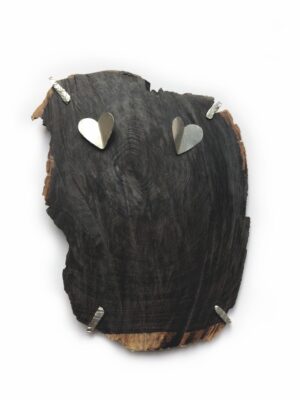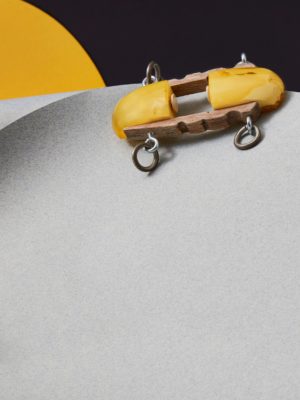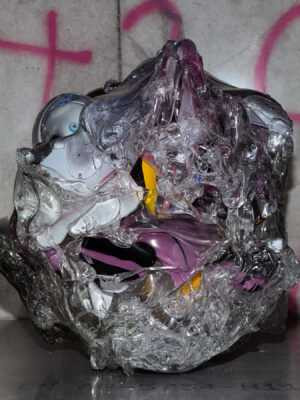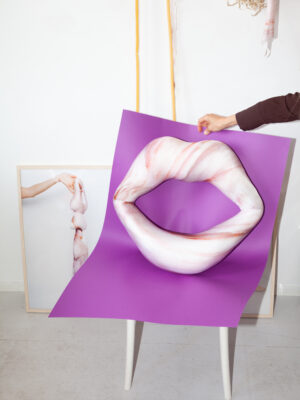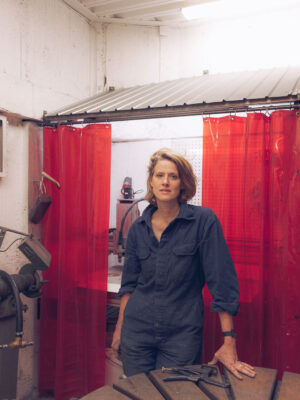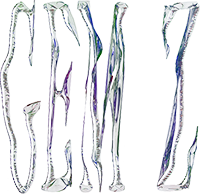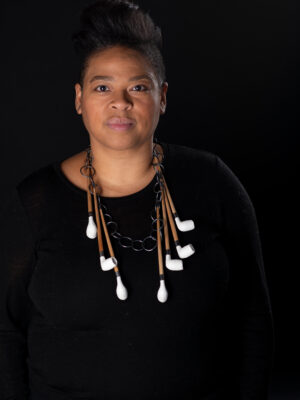
Françoise van den Bosch Award 2022: Chequita Nahar
According to the jury report, Nahar is an important voice in the contemporary jewellery field not only as a maker, but also an educator (head of programme Fine Art and Design, Maastricht Institute of Arts) and curator (Schmuck 2022). She has been an important promoter of diversity and inclusion in art education, fuelling a (sometimes difficult) discussion in the field whilst making sure everyone is included, bringing people together on a topic that often triggers polarisation. Her work reflects a fusion of influences from her bicultural background; growing up in two cultures – Suriname and the Netherlands. She creates jewellery and objects from various materials, such as porcelain, wood, cotton or beads – materials that reflect symbolic power. For her pieces, she combines Afro-Surinamese crafts and techniques with contemporary jewellery methods. For these reasons, Nahar is considered a pioneer in the contemporary jewellery field.
Nahar started making jewellery after she was introduced to the meaning of traditional Surinamese jewellery by her mother. A piece of jewellery is often not only a piece of adornment or decoration, but is worn, for example, to protect yourself from evil spirits or to carry a loved one with you. In Suriname, jewellery is referred to as fanowdu: ‘things we need’. They are objects with a purpose.
Nahar translates these Afro-Surinamese customs and rituals in her work. The materials that she chooses for her pieces are important because they symbolise spiritual power. A common ritual in Suriname is the washing of jewellery. Before a piece of jewellery is given as a gift, it will be washed to cleanse it from any negative energy that might be still clinging to it, but also to honour the big people (ancestors or mentors for example) that walk with you through life. Gourds are often used as a bowl to perform these cleansing rituals. A gourd is therefore an element that is often found in Nahar’s work. Colour, sound or scent also play an important role in her work. Her white porcelain bead necklaces refer to the use of Pimba Doti – a white clay that is used for anointing amulets and other objects related to magic and rituals, but which is also used to decorate the human body to expel evil spirits. The use of porcelain instead of clay is Nahar’s personal interpretation of the tradition.
Nahar used to talk with her grandparents about her jewellery – they discussed how her pieces were her versions of traditional Surinamese jewellery. According to Nahar, there is more cultural exchange in Surinamese nowadays, and that this is also becoming more visible in visual culture. However, customs and traditions remain important, also among younger generations. They continue to make their own interpretation of traditions.
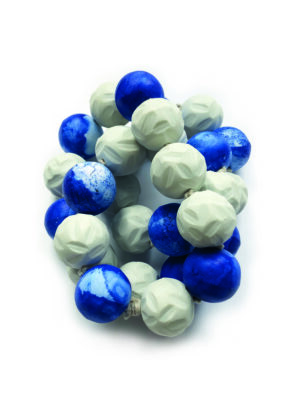
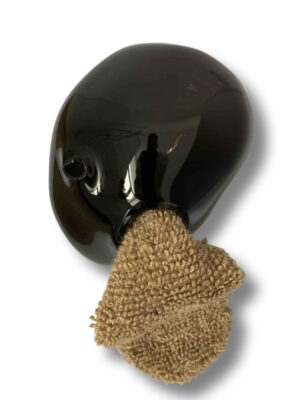
Wasi Sani
Chequita Nahar is doing just that: researching Surinamese jewellery practices and making them her own. She is currently working with the theme of Afro- Surinamese washing rituals, and the role objects and language play in this process. From 5 November – 3 December 2023, the exhibition Wasi Sani will be on show at Museum Arnhem. In the exhibition Chequita Nahar will connect the different ways in which we wash and cleanse ourselves and the world around us.
Almost all cultures and religions know cleansing rituals. Some mark special moments in life, such as the Christian ritual of baptism or cleansing the body of a deceased person. Others are more of an everyday nature: washing ourselves is something we all do. Cleansing rituals have many manifestations and motivations; besides cleansing the body, they can also cleanse the spirit, a building or a place – for example burning sage in a room to cleanse it from negative energy. They release us in a literal and metaphorical sense from dangerous infl uences: bacteria, memories, bad infl uences and in some cases even the devil.
The solo exhibition Wasi Sani exploring this topic will open in Museum Arnhem on 5 November 2023. The exhibition will feature both older and new work of Chequita Nahar, loans from private collectors and works from the collection of Museum Arnhem. Chequita Nahar invited jewellery artist Luisa Kuschel to react to this theme, so also new work from Kuschel will be presented in the exhibition.
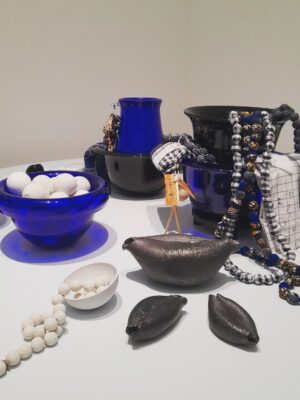
Shifting Perspectives: Diasporic Practices of Adornment and Craft
To get deeper into the themes connected to Nahar’s work, the foundation invited scholars Namita Gupta Wiggers and Kerstin Pinther to give a lecture at the symposium A Sunday Talk with Chequita Nahar – Shifting Perspectives: Diasporic Practices of Adornment & Craft.
The symposium, which will take place on 12 November 2023, will discuss topics such as deconstructing values of design, craft, diaspora and belonging. Namita Gupta Wiggers, Kerstin Pinther and Chequita Nahar will engage in conversation with Stedelijk Museum curator Amanda Pinatih. Spoken word artist Britney Lindo will perform a spoken column. Namita Gupta Wiggers started as a museum educator.
In graduate school, she worked as a research assistant with renowned anthropologists Arjun Appadurai and Carol Breckenridge; it opened her eyes to the interdisciplinary space between anthropology and art history. An interest in home and everyday life led her to studies on craft, including time as a studio jeweller. She is director and co-founder of Critical Craft Forum, an online and onsite platform for exchange, founding director of the MA in Craft Studies (a low-residency programme focused on critical theory and craft history at Warren Wilson College, North Carolina, US) and served as the director and chief curator (2012-14), and curator (2004- 12) at Museum of Contemporary Craft, Portland, Oregon.
In her lecture, she will frame Nahar’s work in what Wiggers calls the craftscape, discussing designated ‘traditional’ craft, generational exchange, and cultural abstraction as part of the practice of exhibiting in museums.
As an expert on transcultural African design, Prof. Dr. Kerstin Pinther will take Chequita Nahar’s artistic work as a starting and reference point to discuss design, art and crafts from a global and a transcultural perspective. She will introduce designers and (jewellery) makers whose work reflect migration, in-betweenness, travelling and exchange – in short: whose objects speak many languages. She will delve into questions of how contemporary designers make use of locally situated knowledge and techniques without being nostalgic and – rather opposite – create with a great sense of the transformative potential of ‘traditional’ concepts and practices. Pinther is currently curator for modern and contemporary art in a global context at the Staatliche Museen in Berlin. Her research focuses on contemporary art, architecture, urbanism and design in Africa and its diaspora. She has written and coedited several publications such as ‘Flow of Forms / Forms of Flow, Design Histories Between Africa and Europe’ (2018) and ‘Fashioning the Afropolis. Histories, Materialities and Aesthetic Practices’ (2022). As a curator, she organised the exhibition ‘Afropolis. City, Media, Art’ (2010-2012) as well as ‘Flow of Forms’ (2017- 2019).
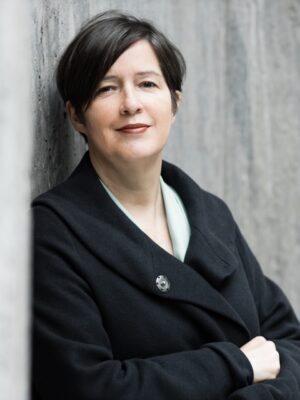
Françoise van den Bosch Award
The Françoise van den Bosch Foundation is committed to supporting contemporary jewellery designers. The foundation does this through acquisitions, an artist-inresidency program and by awarding the Françoise van den Bosch Award. This award is biannually presented to a leading international jewellery artist. In 1980, the fi rst Françoise van den Bosch Award was presented to Paul Derrez. Over forty years later, in 2023, Chequita Nahar will receive the award. The Françoise van den Bosch Foundation is supported by Creative Industries Fund NL.
The exhibition Wasi Sani opens 5 November in Museum Arnhem (The Netherlands) and runs till 3 December 2023 Museums Opening Hours: Tuesday–Sunday, 11:00–17:00
Opening Event: 05.11.2023, 13:00–17:00
A Sunday Talk with Chequita Nahar–Shifting Perspectives: Diasporic Practices of Adornment and Craft will take place on Sunday 12 November 2023 from 14:00–17:00 at Stedelijk Museum Amsterdam
